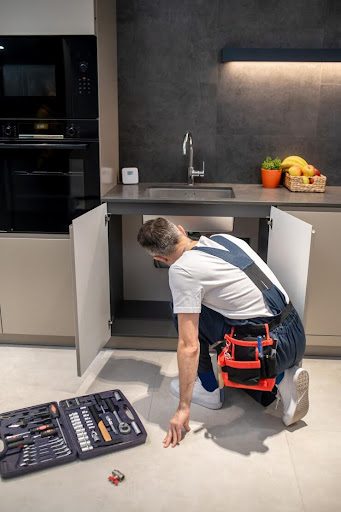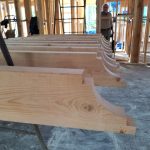
Understanding the Phases of a Kitchen Remodel
One of the most common questions homeowners ask before beginning a renovation is: How long will it take? The Kitchen Remodel Timelinecan vary significantly based on several factors, including the overall size of the kitchen, the scope and complexity of the work, and how well the project is planned and organized from the start. Understanding your Kitchen Remodel Timeline is essential for setting realistic expectations and reducing stress throughout the renovation process. By breaking the entire remodel into clear, manageable phases—such as planning and design, demolition, construction, and finishing—you’ll gain better insight into the full Kitchen Remodel Timeline and learn how to keep everything moving efficiently and on schedule.
Average Timeline for a Kitchen Remodel
Most standard kitchen remodels typically take between 6 to 12 weeks once the actual construction phase begins. However, the complete Kitchen Remodel Timeline often extends beyond that, especially when you consider the time required for design development, material selection, and securing necessary permits. For larger, more customized kitchen renovations that involve structural changes, specialty finishes, or high-end appliances, the Kitchen Remodel Timeline can stretch to 3 to 5 months—or even longer—depending on the complexity and scope of the work. Factoring in all phases from initial planning to final touches is key to setting realistic expectations and avoiding unnecessary delays.
Pre-Construction Phase (2–4 weeks)
- Planning and design consultation
- Budget setting and material selections
- Contractor selection and agreement signing
Permitting and Ordering (2–6 weeks)
- Acquiring necessary permits
- Ordering custom cabinetry, appliances, and materials
- Waiting for deliveries
Demolition (1 week)
- Removing old cabinets, appliances, and flooring
- Disposing of debris and prepping space
Rough Construction (1–2 weeks)
- Electrical, plumbing, and HVAC updates
- Framing or structural adjustments
Installation (2–4 weeks)
- Cabinetry, countertops, lighting, and fixtures
- Appliance installation
- Flooring, backsplashes, and painting
Final Touches & Inspection (1 week)
- Finishing details and trim
- Final walkthrough and inspection
- Clean-up and handover
Factors That Can Impact Your Timeline
1. Project Scope
A full-gut renovation will typically take significantly longer than a minor update, and understanding the scope of work is crucial for setting realistic expectations. A comprehensive Kitchen Remodel Timeline for a complete overhaul can stretch several months, depending on the level of customization and the complexity of the project. It’s essential to clearly define your goals and understand the work involved before beginning, as this will help you gauge how long the process may take and how to manage potential delays. Whether you’re gutting the entire space or simply updating finishes, having a clear sense of the Kitchen Remodel Timeline ensures you stay organized and on track.
2. Custom vs. Standard Materials
Custom cabinetry or countertops often have longer lead times due to the complexity of the design and the time needed for fabrication. These bespoke options can sometimes delay your Kitchen Remodel Timeline, especially if you’re working with a tight schedule. To speed up delivery and keep your project on track, consider opting for ready-to-ship products, which are typically available more quickly and can significantly reduce wait times. By selecting products that are already in stock, you can ensure that your remodel progresses smoothly without unnecessary delays.
3. Permit Approvals
Local building codes and permitting processes can sometimes cause unexpected delays in construction, as each area has its own set of regulations and approval timelines. These requirements can impact the overall Kitchen Remodel Timeline if not carefully managed. To avoid unnecessary hold-ups, it’s essential to work with a contractor who is familiar with regional requirements and has experience navigating the local permitting process. An experienced professional can help ensure that all necessary permits are secured promptly, allowing construction to proceed on schedule and preventing any costly setbacks due to compliance issues.
4. Contractor Scheduling
High-quality contractors, known for their skill and reliability, often book up weeks or even months in advance due to their strong reputation and high demand. As a result, it’s essential to plan ahead and secure your preferred team early in the process to avoid delays in your Kitchen Remodel Timeline. By scheduling in advance, you ensure that your project kicks off on time and with the professionals who best suit your needs, allowing for a smoother and more efficient renovation experience.
5. Change Orders
Mid-project changes to layout or finishes can create significant delays in your Kitchen Remodel Timeline. These adjustments, though sometimes necessary, often require additional time for reordering materials, redesigning spaces, and adjusting schedules. To avoid these setbacks, it’s crucial to finalize all plans, including layout and finishes, before demolition begins. By making these decisions early, you help ensure a smoother, more efficient renovation process, keeping the project on track and preventing unnecessary disruptions to your timeline.
How to Stay on Schedule
- Work with experienced professionals who can manage timelines efficiently.
- Order all materials before demolition begins.
- Set realistic expectations and communicate regularly with your contractor.
- Be decisive during the planning phase to avoid backtracking.
Staying on Track with Your Kitchen Remodel Timeline
A successful kitchen remodel isn’t just about achieving beautiful design—it also relies heavily on smart planning, time management, and a well-structured Kitchen Remodel Timeline. While exact timelines can vary depending on the scope of the project and unexpected challenges, having a clear understanding of each phase in the remodeling process helps homeowners set realistic expectations and avoid frustration. From detailed pre-construction planning and design approvals to demolition, installation, and final inspections, every stage plays a crucial role in completing your kitchen renovation efficiently and on schedule.
Working with experienced professionals who understand the intricacies of the Kitchen Remodel Timeline, ordering materials and appliances well in advance, and sticking to your design decisions are all key strategies to prevent costly delays. Whether you’re embarking on a full-scale kitchen transformation or opting for a smaller-scale update, thoughtful preparation and proactive scheduling are essential to bringing your dream kitchen to life—on time, within budget, and without unnecessary stress.
Ready to Transform Your Home?
At Mazzamuto Construction, we believe great spaces start with thoughtful planning and skilled craftsmanship. Whether you’re exploring ideas or ready to build, our team is here to guide you every step of the way. Let’s bring your vision home—reach out for a personalized consultation today!
Frequently Asked Questions
1. What is the fastest way to remodel a kitchen?
A small-scale remodel using in-stock materials and keeping the existing layout can be completed in 4–6 weeks.
2. Do I need a permit for my kitchen remodel?
Yes, if you’re doing electrical, plumbing, or structural work. Your contractor can help obtain the necessary permits.
3. How long does it take to get kitchen cabinets delivered?
Standard cabinets may take 2–4 weeks, while custom orders can take 6–10 weeks or more depending on the manufacturer.
4. Can I live at home during a kitchen remodel?
In most cases, yes. However, you’ll need to plan for limited kitchen access and potential noise or dust during construction.
5. What delays a kitchen remodel the most?
Delays are often caused by waiting on materials, change orders, or permit issues. Planning ahead and sticking to your design plan helps minimize them.
Essential Takeaways for Your Kitchen Remodel TimelineKey Takeaways
- A typical kitchen remodel timeline ranges from 6 to 12 weeks.
- Pre-construction planning is crucial for keeping the project on track.
- Material availability, permits, and custom work can impact the timeline.
- Work with a reliable contractor to avoid common delays.
- Proper planning helps you stay on time and within budget.




